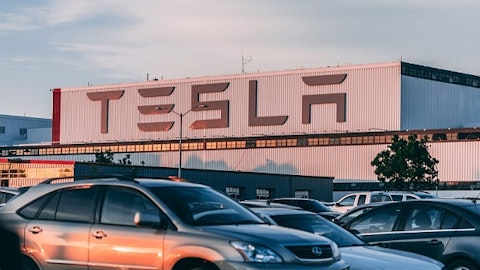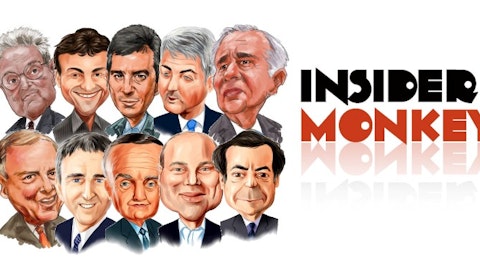In this article, we discuss 10 stocks getting crushed by the global supply chain crisis. If you want to see more stocks that are impacted by tightening supply conditions, click 5 Stocks Getting Crushed by Global Supply Chain Crisis.
These days, the most popular phrase in the stock market seems to be the “global supply chain crisis”. After two pandemic-ridden years of broken supply chains, freight issues, and soaring prices on the back of multiple raw material shortages, businesses and investors alike believed that 2022 would bring some much needed relief from these problems. However, there were newer challenges to navigate, such as the Russia-Ukraine war and the consequent NATO bans on Russian trade, and new COVID-19 variants in China which led to subsequent nationwide lockdowns and tight supply chains yet again. China, which accounts for about 12% of the global trade, has caused perhaps the biggest lag on global supply of raw materials and finished products alike.
The automobile sector is one of the most impacted in this global supply crisis. According to the Harvard Business Review, automakers in 2021 had to cancel plans to build 10 million vehicles. Forecasts suggest that the production of a further 7 or 8 million cars will be canceled in 2022 and 4 million in 2023, as demand for semiconductors continues to outpace supply by 10%. Similarly, big-box and small scale retailers alike are facing extreme supply constraints. While retailers like Walmart, Costco, and Target still somehow manage to keep their inventory in check, smaller retailers are struggling to survive in this global supply crisis.
Some of the most notable stocks that are impacted by the global supply chain crisis include Tesla, Inc. (NASDAQ:TSLA), NVIDIA Corporation (NASDAQ:NVDA), and Ford Motor Company (NYSE:F).
Our Methodology
We assessed companies that majorly rely on imported components and raw materials for this analysis. The chosen stocks were down notably year-to-date as of June 1, and analysts have also recently cited concerns about supply constraints regarding these firms. We have mentioned the hedge fund sentiment around the holdings as of Q1 2022, using Insider Monkey’s extensive database of 900+ top funds for this analysis.
Stocks Getting Crushed by Global Supply Chain Crisis
10. Johnson Controls International plc (NYSE:JCI)
Number of Hedge Fund Holders: 44
Year-to-Date Share Price Decline as of June 1: 31.95%
Johnson Controls International plc (NYSE:JCI) engages in the manufacturing and commissioning of building products and systems in the United States, Europe, the Asia Pacific, and internationally. The company designs and installs heating, ventilating, air conditioning, building management, refrigeration, security, and fire detection and suppression systems. As of June 1, Johnson Controls International plc (NYSE:JCI) stock has dropped about 32%.
On May 4, Johnson Controls International plc (NYSE:JCI) reported its Q1 financial results, posting GAAP earnings per share of $0.02, below consensus estimates by $0.61. The revenue of $6.10 billion also fell short of analysts’ predictions by $61.48 million.
Oppenheimer analyst Noah Kaye on May 5 lowered the price target on Johnson Controls International plc (NYSE:JCI) to $70 from $85 and maintained an Outperform rating on the shares. The analyst observed that the company reported in-line Q2 adjusted EPS and slashed full year 2022 margin/EPS guidance on supply chain constraints.
Among the hedge funds tracked by Insider Monkey, 44 funds reported long positions in Johnson Controls International plc (NYSE:JCI) at the end of March 2022, up from 42 funds in the earlier quarter. Ken Griffin’s Citadel Investment Group is the leading shareholder of the company, with 5.8 million shares worth $385.35 million.
In addition to Tesla, Inc. (NASDAQ:TSLA), NVIDIA Corporation (NASDAQ:NVDA), and Ford Motor Company (NYSE:F), Johnson Controls International plc (NYSE:JCI) is one of the firms hindered by the global supply chain crisis.
Here is what Aristotle Capital Management Value Equity has to say about Johnson Controls International plc (NYSE:JCI) in its Q1 2022 investor letter:
“As investors since the fourth quarter of 2017, we have enjoyed a front-row view of the large transformation that has taken place at Johnson Controls. Once a multi-industrial corporation, the company successfully turned itself into a pure-play buildings solutions and technology provider. Catalysts we previously identified for Johnson Controls included synergies following its merger with Tyco International, which provides fire safety and building security products, as well as benefits from its separation of non-building-focused businesses, such as automotive seating and batteries. With all catalysts in sight now nearing completion, and Johnson Controls now a better business for it – with higher recurring revenues and lower capital intensity – we decided to exit our investment to help fund the purchases of Xcel Energy and Atmos Energy.”
9. General Motors Company (NYSE:GM)
Number of Hedge Fund Holders: 76
Year-to-Date Share Price Decline as of June 1: 37.44%
General Motors Company (NYSE:GM) builds and sells trucks, crossovers, cars, and automobile parts and accessories in North America, the Asia Pacific, the Middle East, Africa, South America, the United States, and China. The stock has declined over 37% year-to-date as of June 1 and it is one of the most prominent companies in the crosshairs of a global supply crisis.
On June 1, Goldman Sachs analyst Mark Delaney lowered the price target on General Motors Company (NYSE:GM) to $46 from $59 and reiterated a Buy rating on the shares. In U.S. autos and industrial technology space, he is largely slashing estimates and price targets to sufficiently account for additional supply chain constraints in the short-term and softer demand in the intermediate-term, the analyst told investors.
General Motors Company (NYSE:GM) announced its Q1 results on April 26. The GAAP EPS of $1.35 missed consensus estimates by $0.15. The revenue of $35.98 billion also fell short of Street forecasts by $1.22 billion.
According to Insider Monkey’s data, hedge funds pulled out of General Motors Company (NYSE:GM) during the first three months of 2022. The number of long hedge fund positions in General Motors Company (NYSE:GM) decreased to 76 in Q1 from 90 in the prior quarter. Warren Buffett’s Berkshire Hathaway is the biggest stakeholder of the company, with 62 million shares worth $2.71 billion.
Here is what Oakmark Global Fund has to say about General Motors Company (NYSE:GM) in its Q1 2022 investor letter:
“General Motors (NYSE:GM) was a detractor during the quarter, due to increased macro uncertainty, higher fuel prices, and concerns over rising input costs, which pressured the company in particular and the auto industry as a whole. While we are closely monitoring the potential impact of these dynamics, industry demand remains robust, driven by strong consumer balance sheets and pent-up demand after multiple years of constrained production. We also remain confident in GM’s ability to navigate a complex operating environment, which the company has consistently demonstrated over the past few years. Finally, the long-term picture remains bright. We believe GM is significantly undervalued, is well-positioned for the long-term transition to electric vehicles and has numerous needle-moving ancillary business opportunities (most notably Cruise, which is an industry leader in autonomous vehicle technology) that are underappreciated.”
8. Texas Instruments Incorporated (NASDAQ:TXN)
Number of Hedge Fund Holders: 46
Year-to-Date Share Price Decline as of June 1: 8.48%
Texas Instruments Incorporated (NASDAQ:TXN) manufactures and sells semiconductors to electronics designers and manufacturers worldwide. It operates through two segments – Analog and Embedded Processing. The shares are down about 8.5% year-to-date as of June 1.
Truist analyst William Stein on April 27 lowered the price target on Texas Instruments Incorporated (NASDAQ:TXN) to $172 from $189 and maintained a Hold rating on the stock. The company reported a “strong” Q1 but guided Q2 “well below consensus”, citing supply chain disruption from COVID lockdowns in China, the analyst told investors in a research thesis. Semiconductors should remain a “challenging space” to invest as downward revisions seem highly plausible, the analyst added.
Among the hedge funds tracked by Insider Monkey, 46 funds reported bullish positions in Texas Instruments Incorporated (NASDAQ:TXN) at the end of March 2022, down from 53 funds in the earlier quarter. Jean-Marie Eveillard’s First Eagle Investment Management is the leading shareholder of the company, with 3.3 million shares worth about $622 million.
Like Tesla, Inc. (NASDAQ:TSLA), NVIDIA Corporation (NASDAQ:NVDA), and Ford Motor Company (NYSE:F), Texas Instruments Incorporated (NASDAQ:TXN) is also navigating supply chain issues.
Here is what Davis Opportunity Fund has to say about Texas Instruments Incorporated (NASDAQ:TXN) in its Q4 2021 investor letter:
“Within technology and communication services, we own a number of online businesses and semiconductor related companies, including Alphabet, Amazon, Intel, Applied Materials and Texas Instruments. Within the realm of high technology, we believe that leadership positions reflect enduring and widening competitive advantages over smaller competitors, with few exceptions. This is because online businesses, as well as semiconductor companies, benefit from economies of scale. An online search and advertising engine will, in general, be more profitable per unit of cost as it grows larger in terms of users and advertising dollars. It is a hub-and-spoke model, in other words, where it is generally not necessary to grow expenses at the same rate that revenues grow beyond a certain threshold. Therefore, returns on capital tend to be higher, the larger and more dominant the online search company is.”
7. Tesla, Inc. (NASDAQ:TSLA)
Number of Hedge Fund Holders: 80
Year-to-Date Share Price Decline as of June 1: 38.29%
Tesla, Inc. (NASDAQ:TSLA) is a Texas-based provider of electric vehicles, energy generation, and battery storage systems in the United States, China, and internationally. Tesla, Inc. (NASDAQ:TSLA) shares have taken a beating so far in 2022, down over 38% year-to-date as of June 1.
Goldman Sachs analyst Mark Delaney on June 1 lowered the price target on Tesla, Inc. (NASDAQ:TSLA) to $1,000 from $1,200 and reiterated a Buy rating on the shares. In U.S. autos and industrial technology, he is broadly cutting down estimates and price targets to accurately reflect tightening supply chains in the short-term and slow demand in the intermediate-term, the analyst told investors. He now forecasts global automobile production of 79 million and 84 million units in 2022 and 2023 respectively, compared to an earlier outlook of 82 million and 86 million units. He also reduced his sales projections for 2022 and 2023, which are now at 14.5 million and 15.75 million, respectively.
According to Insider Monkey’s database, 80 hedge funds reported long positions in Tesla, Inc. (NASDAQ:TSLA) at the end of Q1 2022, down from 91 funds in the earlier quarter. ARK Investment Management is a significant shareholder of the company, with 1.5 million shares worth $1.71 billion.
Here is what Baron Fifth Avenue Growth Fund has to say about Tesla, Inc. (NASDAQ:TSLA) in its Q1 2022 investor letter:
“During the first quarter, we bought back shares in Tesla, Inc., which designs, manufactures, and sells electric vehicles, solar products, energy storage solutions, and batteries. We believe that despite the run in the stock over the last few years, Tesla presents a favorable risk/reward profile and remains a Big Idea with only about 1% market share of the automotive market. Since we bought the stock during the first quarter, shares increased 27.1%, despite a complex supply-chain environment, on continued revenue growth and record profitability. Robust demand and operational optimization allow the company to offset inflationary pressures while vertical integration provides flexibility around supply bottlenecks. Moreover, we expect new localized manufacturing capacity to drive additional efficiencies while software initiatives, including the autonomous driving program, are accelerating, offering valuable optionality to the stock.”
6. NVIDIA Corporation (NASDAQ:NVDA)
Number of Hedge Fund Holders: 102
Year-to-Date Share Price Decline as of June 1: 39.18%
NVIDIA Corporation (NASDAQ:NVDA) was incorporated in 1993 and is headquartered in Santa Clara, California. The company deals in graphics, computing, and networking solutions in the United States, Taiwan, China, and internationally. The stock has tumbled over 39% year-to-date as of June 1.
Benchmark analyst Cody Acree assumed coverage of NVIDIA Corporation (NASDAQ:NVDA) on May 26 with a Buy rating and a price target of $228, down from $365. While the company just posted “another strong quarter” with revenue from Data Center and Gaming both growing robustly quarter-over-quarter and year-over-year, the analyst said that supply chain constraints are likely to persist throughout at least this year. He remains positive on NVIDIA Corporation (NASDAQ:NVDA) since he sees its new software platforms enriching growth of the underlying core business.
According to Insider Monkey’s data, 102 hedge funds placed long calls on NVIDIA Corporation (NASDAQ:NVDA) at the end of the first quarter of 2022, down from 110 funds in the prior quarter. Ken Fisher’s Fisher Asset Management held a prominent position in the company, comprising 7.3 million shares worth about $2 billion.
Here is what RiverPark Long/Short Opportunity Fund has to say about NVIDIA Corporation (NASDAQ:NVDA) in its Q1 2022 investor letter:
“Nvidia is the leading designer of graphics processing chips (commonly known as GPU’s- graphics processing units), required for powerful computer processing. Over the past 20 years, the company has evolved through innovation and adaptation from a predominantly gaming- focused chip vendor to one of the largest semiconductor/software vendors in the world, dominating the core secular growth markets of gaming, data centers and professional visualization. Over the past decade, the company has grown revenue at a compound annual rate of over 20% while expanding operating margins and, through its asset light business model, producing ever increasing amounts of free cash flow. For 2021 the company generated 61% revenue growth to $27 billion, expanded its EBITDA margins to over 44% and generated over $8 billion of free cash flow. Over the past five years, the company has generated a cumulative $23 billion of FCF after cumulative capital expenditures of less than $4 billion.
We expect future growth to remain robust as NVDA chips and software are critical to many of the core technologies being adopted globally, including cloud computing, virtual reality and advanced artificial intelligence. As with NFLX, we took advantage of the over 40% recent drop in the company’s shares over the last several months to initiate a small position.”
Click to continue reading and see 5 Stocks Getting Crushed by Global Supply Chain Crisis.
Suggested articles:
- 12 Best American Stocks To Buy in 2022
- 10 Best Micro-Cap Stocks to Buy According to Hedge Funds
- 10 Best Stocks To Buy For Beginners Right Now
Disclosure: None. 10 Stocks Getting Crushed by Global Supply Chain Crisis is originally published on Insider Monkey.






